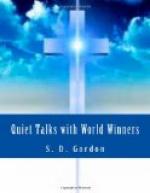Come here and look; you can see in its clear surface the form of a man climbing a little, steep hill, and being hung, thorn-crowned, upon a cross of pain and shame. It is in chapter one, verse two, the word “brooding.” The old version and the Revision, both English and American, have the word “moved.” The Revisions add “brooding” in the margin. And that is the root meaning of the word underneath our English—“brooding,” or, rendered more fully, “was brooding tremulous with love.”
The Genesis Water-mark.
That English word “brooding,” as well as the old word underneath, is a mother word. The brooding hen sits so faithfully, day after day, upon the eggs, bringing the new lives by the vital warmth of her own body. The mother-bird nestles softly down upon the nest in the crotch of the tree, patiently, expectantly brooding, by the strength of her own life giving life to the coming young. She who, in the holiest, greatest function entrusted to her, comes nearest to God in creative power and love—the mother of our human kind, broods for long months over her coming child, giving her very life, until the crisis of birth comes; and then broods still, for months and years longer, that the new life may come into fulness of life. That is the great word used here.
Now, will you please notice very keenly the connection in which it occurs. It was because the earth was “waste and void, and darkness upon the face of the deep,” that the Spirit of God was brooding. It is only fair to say that our scholarly friends who think in Hebrew are divided as to the meaning here. Some think that these words, “waste and void,” simply indicate a stage, or step, in the processes of creation.
But others of them are just as positive in saying that the words point plainly to a disaster of some sort that took place. In their view the whole story of creation is in the ten opening words of the chapter. Then follows a bad break of some sort; then the brooding of God in verse two; and the rest of the chapter is taken up in what is practically a reshaping up again of the whole affair. Some of this second group of Hebrew scholars have made this translation,—“the earth became a waste,” or “a wreck,” or “a ruin,” or “without inhabitant.”
If we may so read it now, it gives a world of additional meaning to this word “brooding.” Here was love not merely giving life, but giving itself to overcome a disaster. The brooding was to mend a break. Love creates. It also redeems. It stoops down with great patience, and washes the dirt and filth thoroughly off, in the best cleansing liquid to be found, and brings the cleansed, redeemed man back again.
Love does indeed create. It gave man the power to choose freely, without any restriction, whatever he would choose to choose. Redeeming love does more. It woos him to choose the right, and only the right. It gets down by his side after his eyesight has become twisted, and his will badly kinked by wrong choosing, and patiently, persistently works to draw him up to the level of choosing right. Love makes us like God in the power of choice. But there’s a greater task ahead. It makes us yet more like Him in the desire to choose only the right, and in the power to choose it, too. All this is in that marvellous world of a word—“brooding.”




